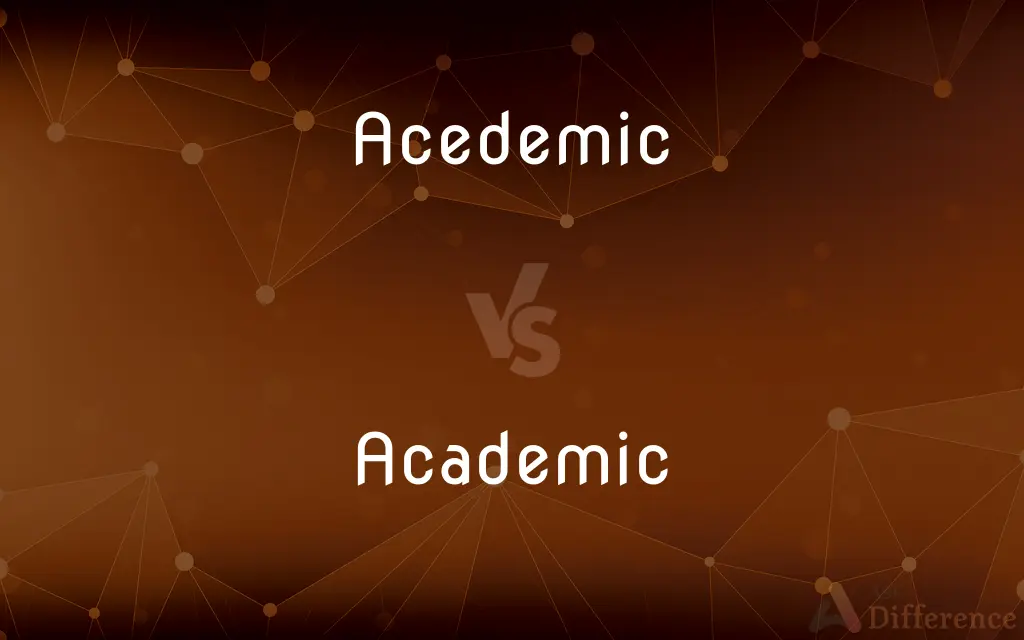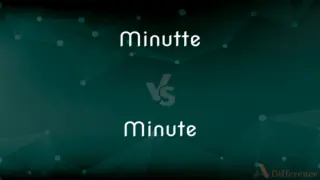Acedemic vs. Academic — Which is Correct Spelling?
Edited by Tayyaba Rehman — By Fiza Rafique — Updated on March 30, 2024
"Acedemic" is a common misspelling; the correct spelling is "academic," which pertains to education or scholarly pursuits.

Table of Contents
Which is correct: Acedemic or Academic
How to spell Academic?

Acedemic
Incorrect Spelling

Academic
Correct Spelling
ADVERTISEMENT
Key Differences
"Aca" sounds like "a car" – visualize a car in a university to link the sound to the word.
There's only one "e" between "d" and "m" in "academic."
Think of "academy," and remember the "a" before the "demic."
Associate "academic" with "academician," both having the same start.
Remember that "academic" has four 'a's.
ADVERTISEMENT
How Do You Spell Academic Correctly?
Incorrect: She received an award for her acedemic excellence.
Correct: She received an award for her academic excellence.
Incorrect: The conference covers a wide range of acedemic subjects.
Correct: The conference covers a wide range of academic subjects.
Incorrect: She has always been interested in acedemic achievements.
Correct: She has always been interested in academic achievements.
Incorrect: There are many acedemic journals in the library.
Correct: There are many academic journals in the library.
Incorrect: His acedemic record is quite impressive.
Correct: His academic record is quite impressive.
Academic Definitions
Pertaining to courses of study.
She chose the academic track in high school.
Relating to schools, colleges, or universities.
She excelled in her academic pursuits.
A member of an institution of learning.
As an academic, he published many papers.
Scholarly or intellectual.
The paper was purely academic in nature.
Theoretical rather than practical.
To him, it was an academic question.
Of or relating to institutionalized education and scholarship, especially at a college or university.
Of or relating to studies that rely on reading and involve abstract thought rather than being primarily practical or technical.
Relating to scholarly performance
A student's academic average.
Academic Of or relating to the conservative style of art promoted by an official academy, especially the Académie des Beaux Arts in France in the nineteenth century.
Having little practical use or value, as by being overly detailed, unengaging, or theoretical
Dismissed the article as a dry, academic exercise.
Having no important consequence or relevancy
The debate about who is to blame has become academic because the business has left town.
A faculty member or scholar at an institution of higher learning, such as a university.
One who has an academic viewpoint or a scholarly background.
Belonging to the school or philosophy of Plato
The academic sect or philosophy
Belonging to an academy or other higher institution of learning, or a scholarly society or organization.
In particular: relating to literary, classical, or artistic studies like the humanities, rather than to technical or vocational studies like engineering or welding.
Having little practical use or value, as by being overly detailed and unengaging, or by being theoretical and speculative with no practical importance.
I have always had an academic interest in hacking.
The distinction is 'academic; an academic question
Having a love of or aptitude for learning.
I'm more academic than athletic — I get lower marks in phys. ed. than in anything else.
(art) Conforming to set rules and traditions; conventional; formalistic.
Subscribing to the architectural standards of Vitruvius.
So scholarly as to be unaware of the outside world; lacking in worldliness; inexperienced in practical matters.
A follower of Plato, a Platonist.
A senior member of an academy, college, or university; a person who attends an academy; a person engaged in scholarly pursuits; one who is academic in practice.
A member of the Academy; an academician.
(archaic) A student in a college.
(pluralonly) Academic dress; academicals.
(pluralonly) Academic studies.
Belonging to the school or philosophy of Plato; as, the Academic sect or philosophy.
Belonging to an academy or other higher institution of learning; scholarly; literary or classical, in distinction from scientific.
One holding the philosophy of Socrates and Plato; a Platonist.
A member of an academy, college, or university; an academician.
An educator who works at a college or university
Associated with academia or an academy;
The academic curriculum
Academic gowns
Hypothetical or theoretical and not expected to produce an immediate or practical result;
An academic discussion
An academic question
Marked by a narrow focus on or display of learning especially its trivial aspects
Academic Meaning in a Sentence
He pursued an academic career after completing his PhD.
Academic journals are a great source for research papers and articles.
He is under pressure to publish his research in academic circles.
The debate team has won several academic awards.
Her academic interests include history and sociology.
Academic scholarships help many students afford higher education.
They discussed the academic implications of their findings.
Academic freedom is essential for fostering innovation and critical thinking.
She's aiming for academic excellence in her studies.
Academic conferences are excellent opportunities for networking.
The university offers a variety of academic programs to its students.
The academic year starts in September and ends in June.
He's compiling his research for an academic publication.
The library's academic resources are invaluable to students.
Academic achievements can open many doors in your career.
He regularly attends academic workshops to improve his skills.
The academic workload can be overwhelming for new students.
She's considering an academic path in environmental science.
Her academic advisor recommended a semester abroad.
Academic integrity is taken very seriously at the institution.
They celebrated the end of the academic year with a party.
The professor has contributed significantly to academic literature.
Maintaining a good academic standing is important for scholarships.
She's known for her rigorous academic standards.
Academic success requires dedication and hard work.
Academic Idioms & Phrases
Academic integrity
The moral code or ethical policy of academia, including honesty and responsibility in scholarship.
Plagiarism is a serious violation of academic integrity.
Academic freedom
The principle that scholars should have freedom in their research and publishing without unreasonable interference.
Academic freedom allows researchers to explore controversial topics.
The academic community
People involved in academic life and work, including teachers, researchers, and students.
The academic community has expressed concerns over the lack of funding for basic research.
Academic question
A question that has no practical relevance or importance, often speculative.
Whether we could live on Mars is, for now, an academic question.
Purely academic
Something theoretical and not of practical relevance.
The discussion was interesting, but purely academic since we have no budget to implement any changes.
Common Curiosities
Why is it called academic?
It derives from "academia," which relates to institutions of learning or education.
What is the verb form of academic?
"Academic" is primarily a noun/adjective; it doesn't have a conventional verb form.
What is the root word of academic?
The root word is "academe" or "academia."
What is the singular form of academic?
"Academic."
Which preposition is used with academic?
"In" as in "in academic research."
What is the pronunciation of academic?
"Academic" is pronounced as "ak-uh-DEM-ik."
Which vowel is used before academic?
"An" as in "an academic discussion."
What is the plural form of academic?
"Academics."
Which article is used with academic?
"An" before singular and "the" for specific reference.
Is academic an adverb?
No, it's not an adverb.
Is academic an abstract noun?
In the sense of "the realm of the academic," it can be.
Is academic a collective noun?
No.
Which conjunction is used with academic?
Any conjunction can be used based on context; "and" is common.
Is the word academic imperative?
No.
How many syllables are in academic?
Four syllables.
What is another term for academic?
"Scholarly."
Which determiner is used with academic?
"This" when specific, "my" for personal.
What is the first form of academic?
"Academic" itself.
Is academic a vowel or consonant?
"Academic" is a word, comprised of both vowels and consonants.
What is a stressed syllable in academic?
The third syllable, "dem."
What is the opposite of academic?
"Non-academic" or "practical."
What is the second form of academic?
Not applicable as it's not a verb.
What is the third form of academic?
Not applicable as it's not a verb.
Is academic a noun or adjective?
It can be both, depending on the context.
Is academic a negative or positive word?
Neutral, but often used in positive contexts.
Is academic a countable noun?
When referring to a scholar, yes. E.g., "There were five academics at the conference."
Is the academic term a metaphor?
Not inherently, but it can be used metaphorically.
What part of speech is academic?
It can be both a noun and an adjective.
How is academic used in a sentence?
"Her academic achievements were recognized by the university."
How do we divide academic into syllables?
ac-a-dem-ic.
Share Your Discovery

Previous Comparison
Minutte vs. Minute
Next Comparison
Begger vs. BaggerAuthor Spotlight
Written by
Fiza RafiqueFiza Rafique is a skilled content writer at AskDifference.com, where she meticulously refines and enhances written pieces. Drawing from her vast editorial expertise, Fiza ensures clarity, accuracy, and precision in every article. Passionate about language, she continually seeks to elevate the quality of content for readers worldwide.
Edited by
Tayyaba RehmanTayyaba Rehman is a distinguished writer, currently serving as a primary contributor to askdifference.com. As a researcher in semantics and etymology, Tayyaba's passion for the complexity of languages and their distinctions has found a perfect home on the platform. Tayyaba delves into the intricacies of language, distinguishing between commonly confused words and phrases, thereby providing clarity for readers worldwide.


































